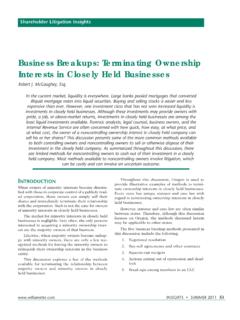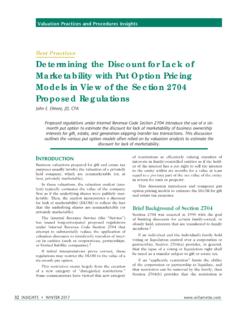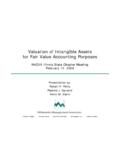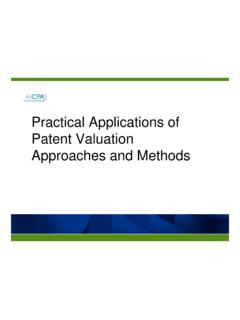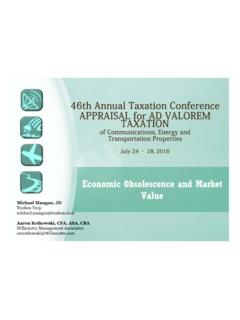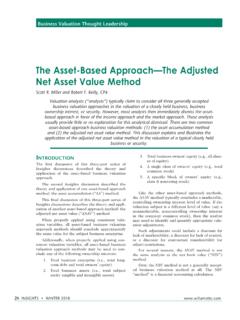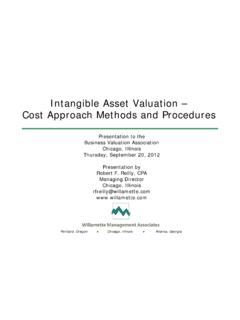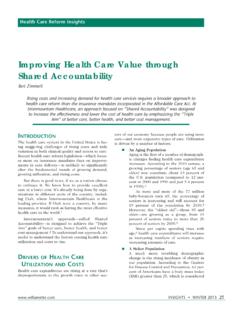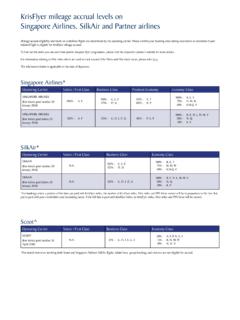Transcription of Earn-Outs: In Search of the “Win-Win” Scenario
1 22 INSIGHTS SUMMER 2013 www .willamette .comEarn- outs : In Search of the Win-Win ScenarioDarius Hartwell, Pricing and Structuring InsightsEarn-out provisions are commonly used in M&A transactions when the buyers and sellers cannot agree upon a specific purchase price before the date of closing. This discussion examines the typical components and characteristics of transactional earn -out provisions, the motivations of the buyers and sellers in transactions involving earn - outs , and some of the common areas of controversy that may arise in the use of earn -out provisions.
2 Finally, this discussion looks at strategies that the transaction participants and their professional advisers can consider in structuring and administering earn - outs that can serve the goals of all parties and avoid do you feel about earn - outs ? No, really, how do you feel? The use of earn - outs in acquisition trans-actions can be an issue that invokes strong visceral reactions and deeply entrenched preferences based on professional experience. On a transaction-by-transaction basis, one s position on earn - outs can depend on a number of surprisingly, whether a transaction partici-pant is on the buy-side (the potential payor of the earn -out) or the sell-side (the potential recipient of the earn -out) can be the determining factor as to whether the earn -out is viewed as a creative solution or a necessary the earn -out proponent, an earn -out facili-tates the closing of the deal that may otherwise not come together.
3 This point of view looks at the earn -out as a compromise, and often refers to the earn -out as a bridge. An earn -out can be the solu-tion that brings the parties together when they are unable to agree on the company s value before the , for those who disfavor the use of an earn -out, this bridge is a last resort. The earn -out is born of a disagreement, the product of the uncomfortable union of bid and ask, reluctantly and begrudgingly accepted in the spirit of completing the the detractor, an earn -out is simply a tool that delays, rather than avoids, a fight.
4 An earn -out can operate to postpone but not necessarily solve the underlying disagreement about the appropriate pur-chase matter where one falls on this philosophical spectrum in a particular transaction, most can agree that a successful earn -out is one that is structured and administered in a way that avoids post-closing discussion attempts to explore the conceptual underpinnings and specific components of earn - outs from a neutral perspective, and to look at strategies that parties on either side of a transaction can employ to increase the chances of a controversy-free earn -out TheoreTical alignmenT oF inTeresTsWhen an earn -out component of purchase price is being considered in a transaction, there is often a point of view advanced that the earn -out is an ele-gant solution.
5 This is because the earn -out provision creates a win-win Scenario . If the earn -out targets are met, then both the buyer and the seller will be happy. This is because the fruits of the company s success will be .willamette .com INSIGHTS SUMMER 2013 23 This concept can be thought of as the theoreti-cal alignment of interests. This basic theory is that an earn -out based on the success of the company creates an inextricable bond between buyer and seller during the earn -out period, where the parties share in both the upside of post-closing success and the disappointment of missed , both experience and common sense tell us that the calculus isn t so simple.
6 earn -out consideration can, and often does, create competing and sometimes counterintuitive s helpful to consider the motivations of the parties in a transaction without an earn -out com-ponent of purchase price. In a typical all-cash-at-closing Scenario , the seller is essentially agnostic on the success of the company post-closing. They have received their value, and they have moved the same all-cash Scenario , the buyer has an unquestioned interest in maximizing profits and all other measures of financial success after it gains control of the entity.
7 The buyer is hoping to capture all the upside it identified when it made the initial decision to purchase the an earn -out is in play, the seller finds itself in the precise philosophical position as the buyer in the all-cash Scenario : the seller is rooting for the company s post-closing financial success because that would trigger or increase the earn -out. This would seem, at first glance, to align the interests of the buyer and , when an earn -out is payable to the sell-er, it operates to (somewhat) modify the motivation of the buyer.
8 The buyer still wishes for the company to be successful, but this hope is tempered by the realization that success now comes with a cost the obligation to pay the earn -out. The buyer is now faced with a potential paradox: how can it maximize post-closing success while minimizing the likelihood or amount of the earn -out payment?Many earn -out disputes are based on allegations that the buyer s post-closing actions intentionally and impermissibly minimized the earn -out payment to the seller. Although these disputes arise in a vari-ety of factual backdrops and can focus on many dif-ferent aspects of the earn -out structure, that basic theme is almost always the deFiniTional approachNo matter what one s existing opinion is with respect to earn - outs , or what one s inclination is on the motivations and interests of the parties involved.
9 It can be instructive to consider various definitions of earn -out in an examination of how disputes can be sources provide several formulations of the basic concept of an earn -out: An agreement for the sale of a business whereby the buyer first pays an agreed amount up front, leaving the final purchase price to be determined by the business s future A contingency component of an acqui-sition agreement in which the acquiring company agrees to additional payments in the event certain performance-based goals are A mechanism used in private M&A transactions by which at least part of the purchase price is calculated by reference to the performance of the target company or business over a period of time after the closing.
10 Typically, an earn -out is structured as one or more contingent payments of purchase price after the closing which are payable when specified targets (such as minimum earnings before the deduction of interest, taxes, depreciation and amortiza-tion (EBITDA) or a minimum number of new customers) are satisfied within speci-fied periods. If the target company fails to achieve these targets within the set periods, the buyer is relieved from making the con-tingent payments (or, in some cases, only required to pay a lesser amount).
